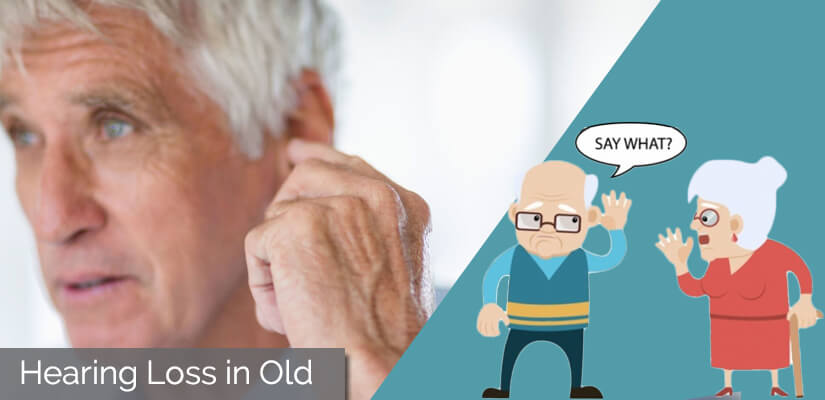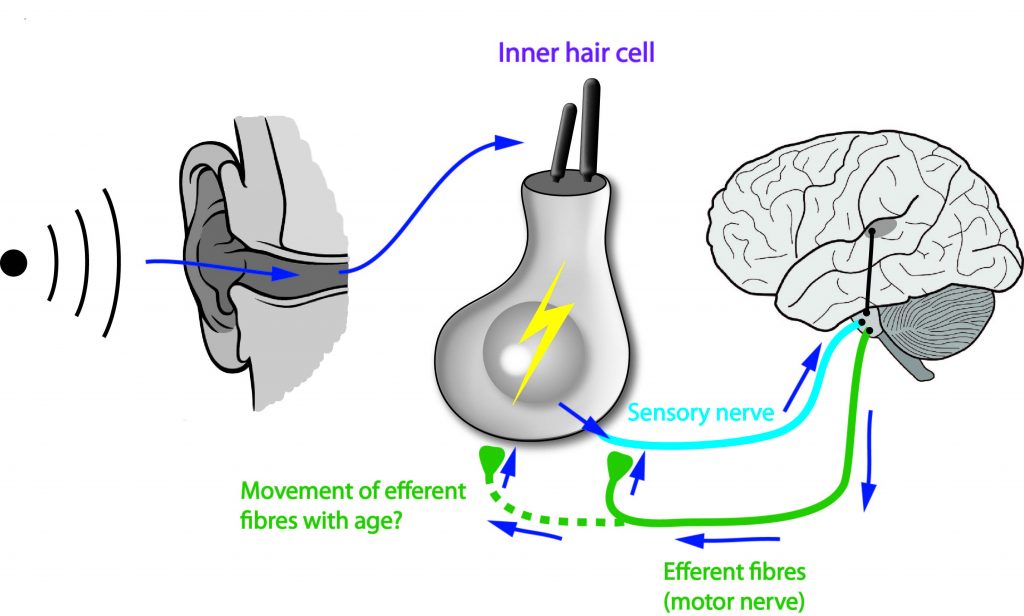
Some degree of hearing loss is observed in over half of the people who are above the age of 60. Many older adults have a hearing loss. There many cases having an age-related hearing loss. But many people are not aware that they have a hearing problem because an age-related hearing loss develops slowly. The old hearing loss most often occurs in both ears affecting equally. The loss is gradual, if you have an age-related hearing loss you may not realize that you’ve lost some of your ability to hear.
You can purchase the latest hearing aids at a fair price through HearingSol, If you need any assistance or you have a query regarding Hearing Aid or Age-Related Hearing Loss, feel free to call us at +91-9327901950. We are always here to help you.
The progressive hearing loss is that which is associated with age, after exposure to loud noises caused due to damage to the tiny hair cell and sound sensing structure.
People generally ask “which terms refer to the progressive hearing loss associated with aging?” Therefore, Presbycusis is the term that is referred to the progressive hearing loss and associated with aging.
What Is Presbycusis Or Age-Related Hearing Loss?
Presbycusis is the loss of hearing that bit by bit happens in many people as they become aged. Hearing loss is a typical issue related to maturity. Around 30-35 percent of grown-ups having age around 65 years have a hearing loss. According to the study and evaluations, 40-50 percent of individuals around 75 years have a progressive hearing impairment.
The term presbycusis alludes to sensorineural hearing hindrance in elderly people. Distinctively, presbycusis includes bilateral high-pitched hearing loss related to trouble in speech separation and central auditory handling of details. Be that as it may, different examples of presbycusis exist.
The relationship between advanced age and high-tone hearing loss was first portrayed by Zwaardemaker in 1899. From that point forward, broad research has endeavored to decide the pathologic changes of presbycusis, yet the correct instruments stay obscure.
The reason for presbycusis is a blend of hereditary qualities, aggregate natural exposures, and pathophysiological changes identified with maturing. Presently there are no safeguard measures known; treatment is by hearing aid or surgical implant.
In some cases, it also occurs in younger people because of exposure to sounds which is part of life such as listening to loud music, attending rock concerts, and other noisemakers.
Age-Related Hearing Loss Causes

Hidden hearing loss can be the first stage or first sign of age-related hearing loss or presbycusis
There is no specific cause for this damage known as presbycusis (also spelled presbyacusis, from Greek press “old” + acoustic “hearing”) but a number of different things that contribute to it like:
- Family history (age-related hearing loss tends to run in families).
- Smoking (smokers are more likely to have such hearing loss than nonsmokers).
- Certain medical conditions, such as diabetes.
- Exposure to the loud noise for a long time.
- Usage of injurious chemicals produced by body cells.
- Consumption of certain medicines over the years that have hearing loss as a side effect.
- Being overweight.
- Hereditary reasons.
Symptoms of Presbycusis
- Sounds or speech becoming dull, muffled or attenuated
- Need for increased volume on television, radio, music and other audio sources
- Difficulty understanding speech, especially women and children
- Difficulty in speech discrimination against background noise (cocktail party effect)
- Persons get difficulty in hearing high-frequency sounds.
- Sensitivity to certain frequencies and volumes of sound.
- Difficulty using the telephone
- Loss of directionality of sound
- Ringing, buzzing, hissing, or other sounds in the ear when no external sound is present.
Treatment of Presbycusis Or Age-Related Hearing Loss
Usually, Presbycusis can be overcome by wearing Hearing Aids, wearables, and also through different Listening Devices. There is a consistently expanding scope of hearing aid and hearable technologies that can enable people to deal with their listening ability misfortune without hardly lifting a finger.
A specialist or another essential care doctor will presumably do some basic primer testing. For more precise testing, your specialist may allude you to an audiologist (an expert in hearing issues) or an otolaryngologist (ear, nose, and throat authority), who will take a total history and perform hearing tests to decide the sort and degree of the hearing misfortune. The doctor can likewise make proposals about hearing aids.
There is no permanent cure for hearing loss in old people but there is a treatment to improve the quality of life of people suffering from it. The following can be of help:
- Telephone amplifiers
- Learning sign language (for severe or prolonged hearing loss)
- Lip reading training
- Hearing aids
- Usage of visual cues to aid communication
- Prevent excess ear wax
Hearing Loss Due To Aging Can Be Prevent?
You cannot prevent hearing loss due to aging but you can protect your hearing ability with age. There are several causes of hearing loss. Aging is one of the major causes of hearing loss but it can be protected by some activities.
How to prevent age-related hearing loss?
Excessive noise exposure damages the delicate hair cells in the inner ear, not dissimilar to the effect of age on the ear. This damage often results in permanent, sensorineural hearing loss. Here are tips to help keep your ears as sharp as possible.
Avoid Too Much Noise
Noisy sounds around you if it’s loud enough to damage your hearing. Sounds from concert speakers, power tools like saws and drills, earphones, and more are all loud enough to damage your hearing.
Be a Quiet Enforcer
Buying appliances and devices that have low noise ratings. And if it’s too loud in the movie theatre, restaurant, or any other place you go often, ask the manager to turn it down.
Limit Loud Sounds in Your Life
Sometimes you can’t avoid the blare of an ambulance siren or the jackhammer on your street corner. But it’s best to limit the amount of time you’re around them. Noisy sound generates hearing loss is a result of the loudness of sounds and how long you hear them.
Wear Hearing Protection
If you know you’re going to be around loud sounds for more than a few minutes, think about wearing protection like Earplugs and Earmuffs
Don’t Smoke
Smoking makes you lose your hearing research said. If you light up, that’s one more good reason to quit. If you aren’t a smoker, avoid breathing secondhand smoke.
Remove Earwax Properly
A buildup of wax in your ears can muffle the sound. But don’t use a cotton swab to clean them out they can push wax deeper in. Use a home irrigation kit to soften the wax and gently wash it out.
Have Your Hearing Test
Make an appointment to get a hearing test if you:
- Have close relatives with hearing loss
- Facing trouble in hearing conversations
- Are around loud noises on a regular basis
- Often hear ringing in your ears
Treatment is largely based on the extent to which the hearing loss exists. This can be evaluated through a hearing test. Regularly consulting with your doctor about your specific health needs is important. According to the world health organization, Approximately one-third of persons over 65 years are affected by disabling hearing loss.
You can purchase the latest hearing aids at a fair price through HearingSol, If you need any assistance or you have a query regarding Hearing Aid or Age-Related Hearing Loss, feel free to call us at +91-9327901950. We are always here to help you.
